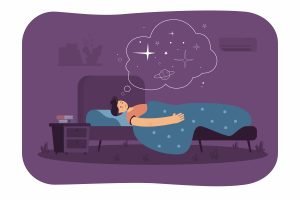Do You Dream Every Night? Facts About Sleep and Dreams You Might Not Know.
Sleep is somewhat of a mystery. Many people still have no idea what happens when we close our eyes.
We spend roughly one-third of our lives sleeping, and we dream during that time. Many theories exist to explain why we dream, but no one knows for certain. Some people believe that dreams have symbolic meaning, while others believe they are related to waking life.
What scientists do know is that nearly everyone dreams when they sleep, and those dreams can be fascinating, exciting, terrifying, or just plain strange. There are numerous interesting facts about sleep and dreams, some of which you may not be aware of.
Here are 12 Facts About Sleep and Dreams You Might Not Know:

You can learn while you dream:
While you sleep, your brain is working on problem solving and learning. If you are learning a new skill or studying new information, getting enough sleep and having dreams can help you learn faster.
Some people dream only in black and white:
Only 12% of people dream in black and white. People under the age of 25 say they almost never dream in black and white, whereas people over the age of 55 say they dream in color about 75% of the time.
Blind People May Dream Visually:
In one study, people who had been blind since birth still appeared to have visual imagery in their dreams, and their eye movements correlated with visual dream recall.
Although the blind participants had fewer REM eye movements than the sighted participants, they experienced the same dream sensations, including visual content.
Animals also have dreams:
Humans are not the only species that dreams. Many animals have increased brain activity and dream while sleeping.
The record-breaking period of sleep deprivation is 11 days, 25 minutes:
A student went 264.4 hours without sleep while still in high school, winning first place in the 10th Annual Great San Diego Science Fair in 1964.

We Forget Most of Our Dreams:
We forget up to 95% of our dreams shortly after waking up.
According to one theory, changes in the brain during sleep do not support the information processing and storage required to form memories.
A change in the levels of some neurotransmitters, specifically acetylcholine and norepinephrine, during REM sleep may also cause us to forget our dreams.
Men and Women Dream Differently:
Researchers have found differences in dream content between men and women.
Men reported dreaming about weapons significantly more frequently than women, while women dreamed about clothing more frequently than men.
Daylight savings can be a killer:
We lose an hour of sleep when the clocks spring forward, and the number of fatal heart attacks rises. When we set our clocks back an hour, we gain an hour of sleep and our risk of heart attack decreases. It just goes to show how even losing an hour of sleep can have a significant impact on your health.
Ten minutes is key to falling asleep:
It is common to fall asleep 10-20 minutes after going to bed. You’re probably exhausted and sleep deprived if it takes you less than five minutes to fall asleep. Practice good sleep hygiene to help your body fall asleep quickly every night so it can catch some z’s. Setting a sleep schedule, putting phones and other bright technology away 30 minutes before bedtime, and other measures are required.

Do you believe you don’t dream? Think again:
Humans typically have four to six dreams per night. Dreams are extremely important, according to many sleep scientists, because they help your brain process the events of the day. If you believe you don’t dream every night, it’s more likely that you’ve forgotten your dreams by the time you wake up.
Dreams recharge your creativity:
Sleep recharges your body, and dreams recharge your creativity. This is due to the fact that dreams are similar to creativity. When the brain solves problems in dreams, it actually mimics the creative, waking thought process. As a result, many artists are more likely to be inspired by their dreams and to think creatively while awake.
When you are dreaming, your mind is more active than when you are awake:
Even though your body is sleeping, your mind is more active than when you are awake. During dreams, your mind is learning, problem solving, and filing, sorting, and making sense of all the information you absorbed during the day.
Follow WalPencil to get to know more articles like
